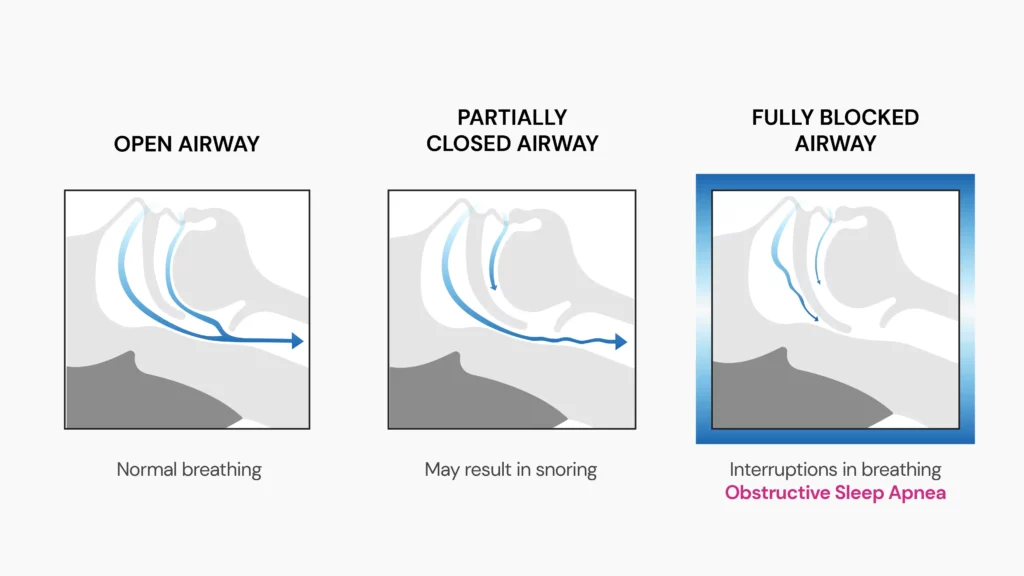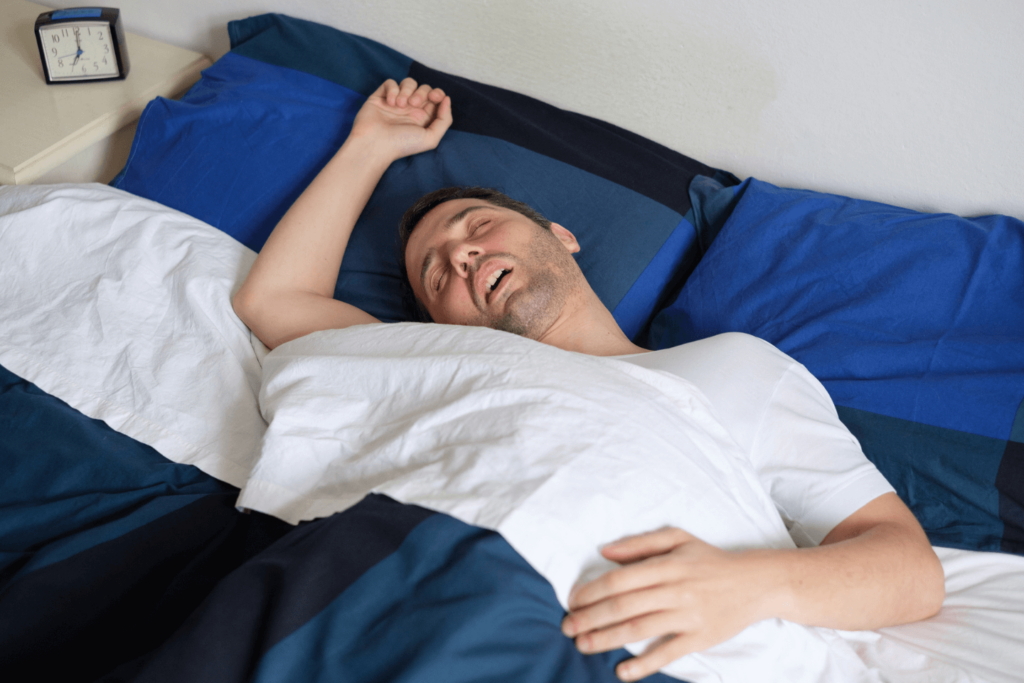Do you wake up every morning feeling exhausted despite hours spent in bed? This isn't just a matter of inadequate sleep but could be a sign of a serious condition affecting health and quality of life. With a striking 40% of obese individuals experiencing significant sleep apnea and 70% of OSA patients being obese, the search for effective solutions becomes crucial. Could weight loss be the most powerful tool in tackling this widespread issue? Read further to see how making one significant lifestyle change might hold the secret to better sleep and improved health.
Understanding Sleep Apnea
Sleep apnea is characterized by repeated breathing stoppages during sleep. It causes sleep disruptions and increases the risk of long-term health issues.
The most common form, obstructive sleep apnea (OSA), arises when throat muscles relax and block the airway.
This blockage causes pauses in breathing, resulting in low oxygen levels, which trigger the brain to wake the body just enough to restore normal breathing.
Although this response prevents suffocation, it interrupts the sleep cycle and stops the body from reaching the deep, restful sleep necessary for overall health.

If sleep apnea remains untreated, it can contribute to serious health risks, including heart disease, hypertension, and stroke.
Common treatments for OSA focus on keeping the airways open during sleep. These include:
- CPAP (continuous positive airway pressure) machines maintain an open airway by continuously supplying air through a mask during sleep.
- Oral appliances are positioned in the mouth to reposition the jaw or tongue and prevent airway obstruction. These are custom-fitted by dentists for maximum comfort and effectiveness.
- Surgery, an option in some instances, may involve removing tissue from the throat, adjusting the jaw, or using nerve stimulation implants to keep the airway open.
These treatments aim to improve sleep quality and prevent the health risks associated with sleep apnea.
The Link Between Body Weight And Sleep Apnea
This relationship is complex and multifaceted, as each condition can exacerbate the other, worsening symptoms and overall health.
Obesity, characterized by excessive body fat, particularly around the neck and abdomen, can significantly increase the likelihood of developing OSA.
Conversely, OSA can lead to weight gain and make it more difficult for individuals to lose weight, creating a vicious cycle that is hard to break.
How Weight Gain Contributes To Sleep Apnea
Excess fat around the neck and upper body can put pressure on the airways and cause them to collapse during sleep, leading to breathing interruptions and apnea episodes.
Studies have shown that for every 1-point increase in body mass index (BMI), the risk of OSA increases by 14%.
Obesity or being overweight contributes to OSA in the following ways:
- Physical pressure on airways: The pressure on the upper airway during sleep can lead to airway obstruction, a hallmark of OSA.
- Inflammation: Obesity is associated with increased inflammation in the body, which can contribute to the narrowing of the airways. Fat tissue releases inflammatory substances that can further compromise respiratory function.
- Hormonal changes: Increased body fat can lead to hormonal changes that affect sleep patterns and respiratory control. For instance, higher levels of leptin, a hormone produced by fat cells, can disrupt the normal regulation of breathing during sleep.
How Sleep Apnea Contributes To Weight Gain
Sleep apnea can lead to weight gain through several mechanisms:
- Disrupted sleep patterns: OSA causes frequent awakenings throughout the night, leading to poor sleep quality. Lack of restorative sleep can disrupt hormones that regulate appetite, such as ghrelin and leptin, leading to increased hunger and cravings.
- Fatigue and reduced activity: People with OSA often experience daytime fatigue, which can result in decreased physical activity. This sedentary lifestyle can contribute to weight gain over time.
- Metabolic changes: OSA is linked to insulin resistance and metabolic syndrome, conditions that can make it more difficult to maintain a healthy weight. The stress of repeated apneas can also lead to increased cortisol levels, which is associated with weight gain, particularly in the abdominal area.
Weight Loss as a Treatment for Sleep Apnea
Weight loss is an effective strategy for managing obstructive sleep apnea (OSA), particularly for individuals who are overweight or obese.
According to a mathematical model, for every 7-pound drop in weight, there is a corresponding 7% decrease in the apnea-hypopnea index (AHI), which measures the severity of sleep apnea.
Let us see how weight loss helps treat sleep apnea.
- Reduction in airway obstruction: Research indicates that losing just 5-10% of body weight can significantly improve sleep apnea symptoms. More specifically, a 2022 study involving 180 participants indicated that a 5% weight loss improved symptoms, while a 10% loss provided even greater benefits.
- Localized fat loss: Research has shown that weight loss can also reduce fat deposits in specific areas, such as the tongue, which can block the airway. A small study in 2019 found that participants who lost weight experienced a reduction in tongue fat, leading to improved apnea symptoms. This suggests that targeted weight loss can have a direct impact on airway function during sleep.
- Overall Health Benefits: Weight loss not only helps with sleep apnea but also improves overall health. It can reduce the risk of associated conditions such as high blood pressure, diabetes, and cardiovascular disease. A review in Obesity Reviews noted that weight loss of 10-15% can reduce the severity of OSA by up to 50% in moderately obese patients, leading to better sleep quality and daytime functioning.
It is important to note here that while weight loss significantly improves OSA, it may not fully resolve the condition for everyone.
Other treatments, such as CPAP therapy, may still be necessary.
Effective Weight Loss Strategies For Sleep Apnea
Combining dietary changes, increased physical activity, and behavioral therapy can significantly improve weight loss and sleep apnea symptoms. Here’s how:
Dietary Changes
A calorie-restricted, well-balanced diet is fundamental for weight loss, particularly for those managing sleep apnea.
Aiming for around 1,200–1,500 calories* per day for females and 1,500–1,800 calories* for males is recommended. This approach helps reduce excess body fat, which is often linked to the worsening of sleep apnea.
- Focus on portion control: Eating smaller, balanced meals at regular intervals throughout the day can aid in managing calorie intake without feeling unsatisfied.
- Plan meals in advance: Planning your meals can help you avoid unplanned, unhealthy food choices that might slow down your progress.
- Avoid late-night eating: Eating right before bed can disrupt sleep and digestion, which is particularly important for those with sleep apnea.
*The exact calorie requirement for weight loss varies from person to person. Please consult a qualified nutritionist before making any significant changes to your diet
Increased Physical Activity
Physical activity is vital to both weight loss and improving the body's overall functioning.
Regular exercise burns calories and strengthens muscles that help maintain open airways during sleep.
- Incorporate regular exercise: Aiming for at least 30 minutes of moderate physical activity, like walking, five days a week can significantly enhance weight loss efforts. Consistent physical activity also helps manage sleep apnea symptoms by reducing fat accumulation around the neck area.
- Increase daily movement: Simple lifestyle changes, like using the stairs over the elevator, parking farther from your destination, or standing while working, can make a significant difference. These actions can boost calorie burn and support weight management.
Behavioral Therapy
Behavioral therapy can be instrumental in developing sustainable weight loss habits and overcoming mental or emotional barriers that may affect weight management.
- Track progress: Regularly monitoring your calorie intake, physical activity, and weight can keep you accountable and help identify areas for improvement.
- Work with a professional: A nutritionist, dietitian, or counselor can create personalized strategies to address challenges such as emotional eating or low motivation.
Complementary Strategies Alongside Weight Loss
While weight loss is a critical intervention, there are additional lifestyle changes and therapeutic approaches that can amplify its effects.
Let’s take a closer look at these strategies:
- Sleeping position: Sleeping on your side instead of your back can reduce OSA symptoms. Special pillows or devices can help you stay in the correct position.
- Quit smoking: Smoking increases airway inflammation. Quitting can help improve breathing and reduce the severity of sleep apnea.
- Avoid alcohol and sedatives: These relax throat muscles, making OSA worse. Avoiding them, especially in the evening, can improve sleep quality.
- Throat exercises: Specific exercises to strengthen throat muscles can reduce OSA by helping keep airways open during sleep.
- Manage stress: Reducing stress through relaxation techniques or therapy can improve sleep patterns and help with weight management.
However, CPAP therapy and other sleep apnea treatments may still be necessary in some cases, especially when OSA is moderate to severe.
Summary
- Sleep apnea interrupts breathing during sleep, increasing the risk of health issues such as cardiovascular disease and stroke.
- OSA, the most prevalent form of sleep apnea, results from throat muscle relaxation that blocks the airway.
- Common treatments include CPAP machines, oral appliances, and surgery to keep airways open.
- Excess weight, especially fat around the neck and abdomen, plays a key role in OSA.
- Weight loss can significantly reduce OSA severity, particularly by reducing tongue and neck fat.
- Evidence shows that losing weight is closely associated with reduced symptoms of OSA.
- Effective weight loss strategies include calorie-restricted diets, regular exercise, and behavioral therapy.
- Some additional strategies like changing sleep positions, quitting smoking, and managing stress can improve OSA.
- CPAP therapy may still be required in moderate to severe cases of sleep apnea.
Others Are Also Reading

Is Sleep Apnea Genetic? Risk Factors, Treatment, And More

Can Sleep Apnea Lead To Brain Damage?

Can Vitamin B12 Help In Weight Loss?
References
https://www.ahajournals.org/doi/full/10.1161/01.hyp.0000101686.98973.a3
https://my.clevelandclinic.org/health/diseases/8718-sleep-apnea
https://www.nhlbi.nih.gov/health/sleep-apnea/treatment
https://www.sleepfoundation.org/sleep-apnea/weight-loss-and-sleep-apnea
https://www.atsjournals.org/doi/10.1164/rccm.201903-0692OC
https://www.healthline.com/health/sleep-apnea/sleep-apnea-weight-loss
https://www.hopkinsmedicine.org/health/wellness-and-prevention/choosing-the-best-sleep-position
https://www.nature.com/articles/s41598-023-34956-5
https://www.sleepapnea.org/snoring/mouth-exercises-to-stop-snoring/




